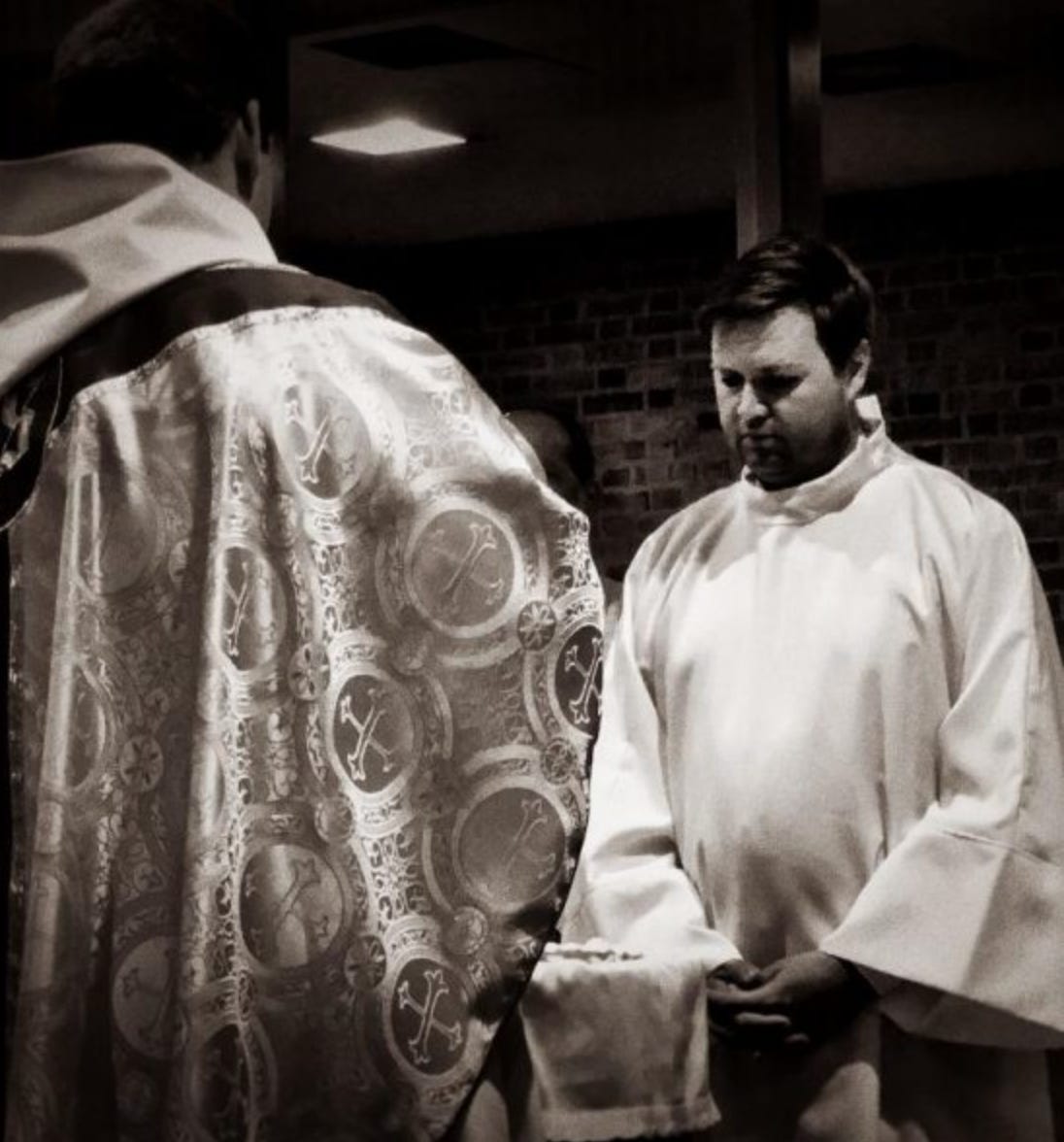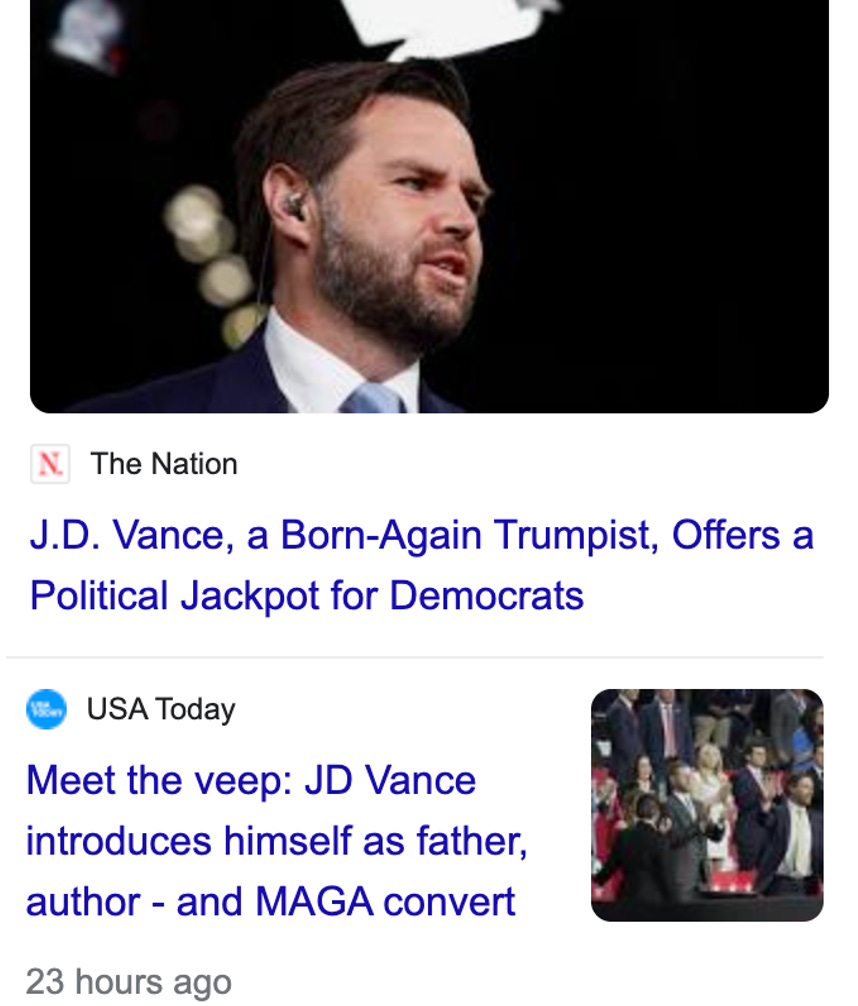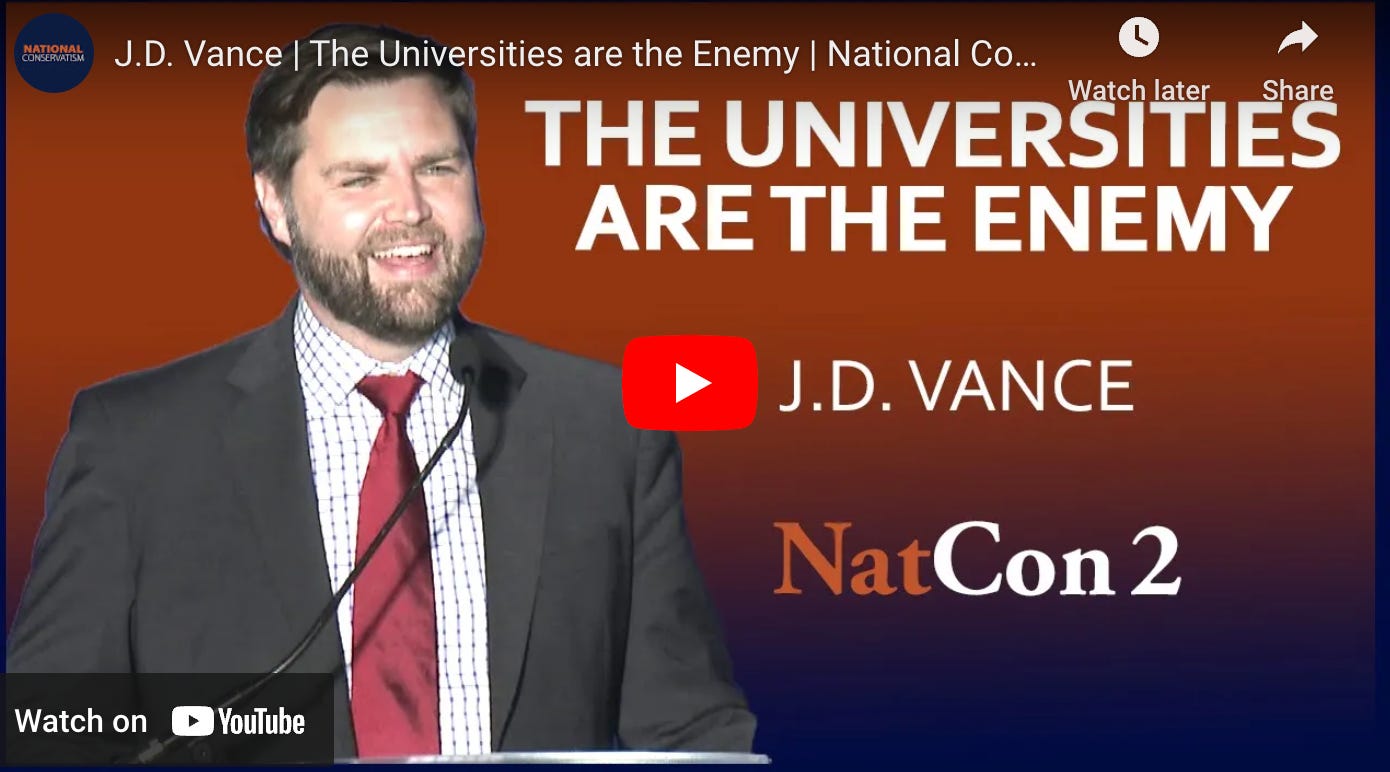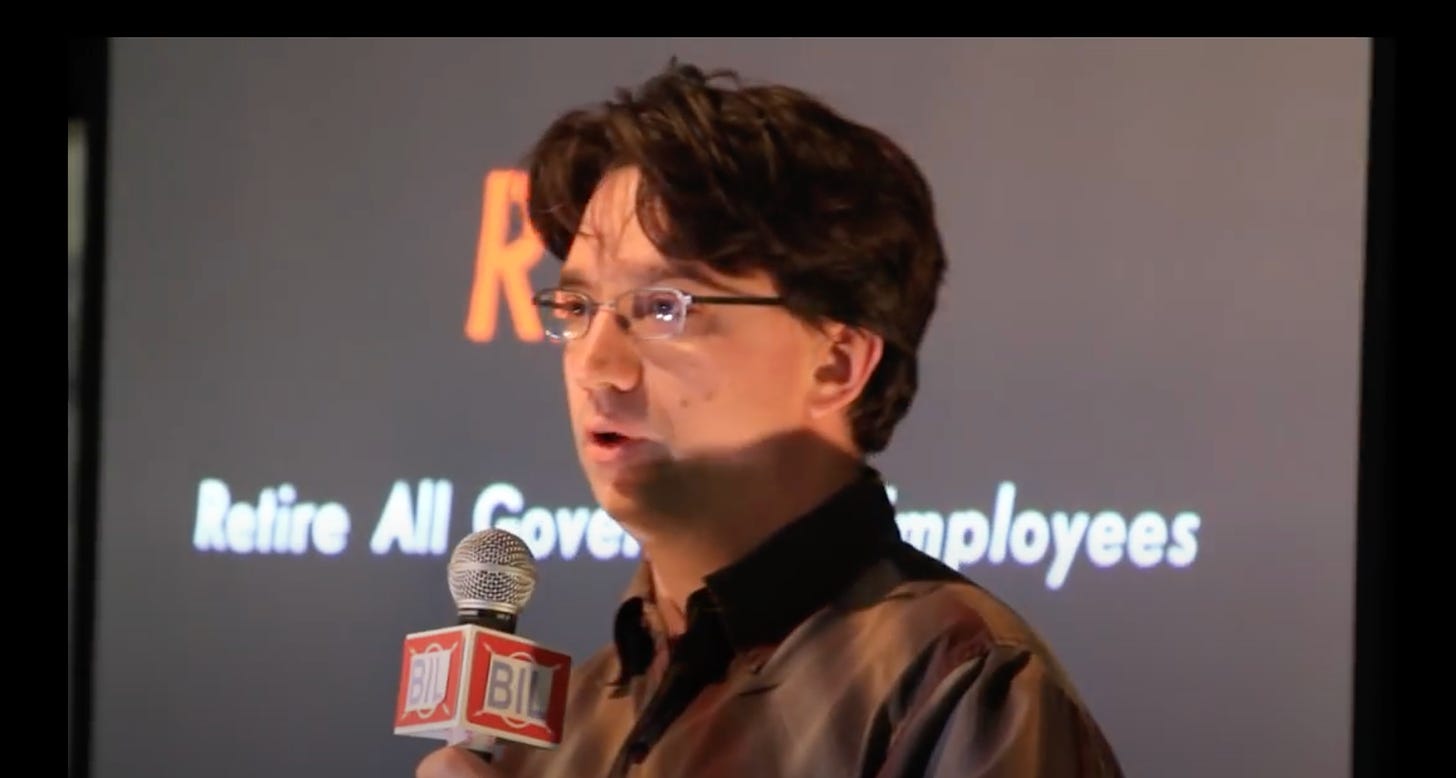Much of the coverage of JD Vance presents has implied, if not outright stated, that Vance is a hypocrite and opportunist. How else do you explain someone who denounced Trump in a myriad of ways, and then jumped onto Trump bandwagon when struggling in his primary race? How else can we understand a man who compared Trump to Hitler, and some years later was his most dogged defender? Vance once said that Trump was willing to lie about election outcomes. How did he become someone who not only repeated those lies, but declared that he would have willingly gone where Mike Pence dared not to, and facilitated Trump’s plan to stay in office despite losing an election?
But I think the idea of Vance as a hypocrite misses something both more profound, and more plausible. I want to explore the idea that Vance is actually sincere in his embrace of Trump now, or at least has committed to a broader world view where Trump is an powerful if imperfect means to further those beliefs. To be sure, Vance’s beliefs happen to align with what was politically expedient. But people invest themselves into the roles they play. Back when he rejected Trump, Vance was playing the role an intellectual, the explainer of America’s White working class. Now he is playing a different role, one which explicitly rejects the institutions he once embraced.
Vance is, on his face, not a likely candidate for MAGA populism. He went to a great public university using the GI Bill. From there, he vaulted into the elite status of Yale Law. He became a best-selling author, and made millions in the world of business. At the age of 39, having won a grand total of one election, he is favored to become Vice President. On its face, it is an American success story, complete with the moral that discipline and hard work can overcome the most humble of circumstances. Look closer, and the story of merit sags somewhat. His new-found antagonism towards elites overlooks how he has benefited from the connections of Yale, political sponsorship from people like Peter Thiel, and a spot on the Presidential ticket thanks to the lobbying of the President’s son and the richest man in the world.
But one thing we have learned again and again is that populism is fueled by a sense of victimhood and anger, even among those who have achieved or been handed great fortune. John Ganz wrote a compelling essay about Vance’s comfort with the American right, one grounded in a shared sense of resentment and anger.
Trump’s GOP was never about a coherent policy regime or even ideology; it’s a structure of feeling and Vance embodies that: Anger, wounded pride, resentment, contempt, and ultimately, hatred and despair. More than anyone else on offer perhaps he is the New Republican Man. This is why he was picked.
Vance is still a relatively young man, young enough to adapt himself, and then rationalize those changes. He is an adult convert to Catholicism. Some of the coverage of Vance’s change of heart about Trump has used religious language: Vance is a “MAGA convert” and “born-again Trumpist”
I imagine that as with his religious faith that he does not view his political conversion to Trumpism as a measure of hypocrisy but a journey of discovery. Indeed, his political and religious conversions are intertwined. Vance converted to Catholicism in 2019. When asked why he wanted to become Catholic, he said:
But it’s too easy to intellectualize this. When I looked at the people who meant the most to me, they were Catholic. My uncle by marriage is a Catholic. Rene Girard is someone I only know by reading him, and he was Catholic.
This is a profoundly odd response. Vance says his motivations were not intellectual, and then evokes two Catholics he admires. His uncle — by marriage! — and a French intellectual he has never met. Girard was indeed Catholic. More to the point, he is the former professor and favorite philosopher of Peter Thiel.
Vance’s conversion to Catholicism very much seems to have been not just an intellectual project, but a political one. At his baptism he was accompanied by the right wing writer Rod Dreher. Vance announced the conversion to Dreher in The American Conservative in an interview where Vance discussed the interplay of faith and politics. His model of politics seems to mirror the integralist view of Catholicism as a basis for governing, reflected by conservative political theorist Patrick Deneen.
Vance has publicly cited Deneen as a major intellectual influence and even appeared on a panel with him at the book launch for Regime Change, hosted at Catholic University in 2023. At the event, Vance identified himself as member of the “postliberal right” and said he views his role in Congress as “explicitly anti-regime,” channeling Deneen’s critic of liberal progressivism. In a statement after Vance’s selection, Deneen praised him as “a man of deep personal faith and integrity, a devoted family man, a generous friend, and a genuine patriot.”
As the title, Regime Change, suggests, Deneen’s writings call for radical action to break institutions. It is, in many ways, an intellectualization of the core idea of populsim: the corrupt institutions are holding back the true people, so lets smash them. Vance is also influenced by another Catholic convert prominent on the far right, Sohrab Ahmari. As with Deneen, Ahmari calls for the right to take control of public institutions, using them to impose their values, rather than shrinking government. For example, Ahrami denounced the tolerance of non-traditional lifestyles, calling on the right to “fight the culture war with the aim of defeating the enemy and enjoying the spoils in the form of a public square reordered to the common good and ultimately the Highest Good.”
Apart from his flip flopping on Trump, nowhere is Vance’s political conversion clearer than in the area of higher education. Vance has declared that “the professors are the enemy.” In this, he echoes not just Richard Nixon, but another Thiel’s philosopher, Curtis Yarvin, who proclaims that universities are a central part of “the cathedral” nefariously controlling society. As with Deneen, Yarvin is merely putting a intellectual gloss on the common populist suspicion of higher education.
One wonders what Vance’s in-laws, both college professors make of his claims. Vance rails against cancel culture in universities. But he also embraces state censorship. For example, he recently said:
You know, the closest that conservatives have ever gotten to successfully dealing with left-wing domination of universities is Viktor Orbán’s approach in Hungary. I think his way has to be the model for us: not to eliminate universities, but to give the a choice between survival or taking a much less biased approach to teaching…And whether it’s the incentives that you put into place, funding decisions that are made, and the curricula that are developed, you really can use politics to influence culture. And we should be doing more of that on the American Right.
To be clear, Orban has banned entire field of studies and even shut down a university. He loathes the idea of any sort of campus speech that would delegitimate the ruling regime or its values. He is the textbook example of an authoritarian. This is precisely what makes him appealing to people like Vance.
You simply cannot have any genuine conviction about protecting campus speech while pointing to Orban as a model to emulate. This seeming incongruity is not surprising when you look at Vance’s influences, many of whom have praised or legitimated Orban’s actions. Rod Dreher even decamped for Hungary to work for Orban. They are uninterested in free speech, but in the use of state power to shut down the speech they dislike. Vance might describe himself as part of the “postliberal right” and Orban boasts of an “illiberal democracy” but they have much the same idea. Vance has explicitly suggested that universities should lose federal money, e.g. for Pell grants, or funding for basic science, if they are teaching what people like him determine to be objectionable ideas.
Vance has pledged to use state power to also go after foundations and universities he disagrees with by removing their nonprofit tax status. In discussing Harvard University and the Ford Foundation, Vance said:
We are talking about hundreds of billions of dollars in ill-gotten accumulated wealth. It serves as a tax haven for left-wing billionaires and what do they do with this? They fund critical race theory, they fund ridiculous racism, they fund teaching 6-year-olds that they should, you know, cast off their gender. We are actively subsidizing the people who are destroying this country, and they call it a charity. It's just ridiculous.
The crime of Harvard and Ford Foundation? Funding diversity, equity and inclusion programs. Vance does not talk about conservative leaning organizations or advocacy groups, of course, which also have been active in shaping campus politics. Should Turning Point, Young America’s Foundation, or the Federalist Society lose their tax exempt status?
Elsewhere, Vance has proposed increased taxes on private universities with large endowments (but religious universities are exempted, so no worries Notre Dame!). He asked “Why is it that we allow these massive hedge funds pretending to be universities to enjoy lower tax rates than most of our citizens, people who are struggling to put food on the table and buy Christmas presents this season?” Why indeed? But it also bears noting that actual hedge funds also enjoy lower tax rates than most citizens. Vance ran a hedge fund with Silicon Valley funding, and benefited from the carried interest loophole. Vance will crusade against universities he says act like hedge funds, while not touching the hedge fund community he is a part of.
Vance did not have the same complaints about universities before joining the far right. In Hillbilly Elegy he described “education in America, which the majority of people rightfully believe is the key to opportunity.” Indeed, no part of American society so embraced Vance more warmly than college campuses. Even as Vance rails against DEI, the same motivation that fuels such efforts — a willingness to take action (sometimes clumsily) to include and understand underrepresented groups — fueled his rise as a campus staple. His book became required reading among the educated elite seeking to understand the travails of the White working class that supported Trump. When I was at the University of Wisconsin Madison it was promoted by university leadership as a book that the entire campus should read. Vance sought and received five figure speaking fees to come to college campuses to talk about poverty.
It is not just higher education. Vance has embraced the attacks on other institutions that characterize Trumpism. Vance blocked Department of Justice political appointees from taking their leadership positions, regardless of their qualification, because he objected to prosecutions against Donald Trump. Such prosecutions made America “a banana republic where the president is using his Department of Justice to go after his chief political rival.” (Biden has taken pains not to involve himself in DOJ investigations, including unusually punitive prosecution of his son). But Vance is supportive of Trump doing what he has falsely accused Biden of: directing the DOJ to go after his political rivals.
Vance also proposes gutting the non-partisan civil service.
I think that what Trump should—like, if I was giving him one piece of advice—fire every single mid-level bureaucrat, every civil servant in the administrative state. Replace them with our people. And when the courts—because you will get taken to court—and when the courts stop you, stand before the country like Andrew Jackson did and say, ‘The chief justice has made his ruling. Now let him enforce it.’
This is a deeply unpopular position with the American public, even without Vance’s call to simply ignore the law. With Schedule F and a supportive Supreme Court, Trump would bring such a vision close to reality. Vance’s call also echoes Curtis Yarvin’s call to “retire all government employees” and indeed Vance cited Yarvin as an influence in the same podcast where he called for mass firings of civil servants.
Andrew Prokop offers an excellent profile of Yarvin and his rise as the type of reactionary Thiel-aligned amateur philosopher that seems to have broad appeal amongst the Silicon Valley elite. Yarvin is fiercely critical of the civil service, but also of democracy in general. Yarvin has called for a leader exercises power akin to US occupying force in Japan and Germany. An occupying force in our own country! Say goodbye to due process, rights or other forms of accountability.
Beyond the fascistic language, Yarvin’s theory of how public organizations work is also a pure fantasy. There is no acknowledgment that experience, stability and public service motivation matter to governing. Crucially, it is a theory advanced by people in the start-up world where organizations are small, disruption is king and organizational failure isn’t all that consequential. But profound failure or corruption of leadership in a public setting, where the government exercises sovereign power and cannot go out of business, is a different matter, and a reason why governments are subject to greater accountability than their private peers.
Yarvin’s theorizing runs parallels the unitary executive theory that Trump Project 2025 and, increasingly, the Supreme Court advances. Trump has summarized this idea succinctly: “'I have an Article 2 where I have the right to do whatever I want as president” (Article II is the vesting clause of the constitution, which simply says that “The executive Power [of the United States] shall be vested in a President of the United States of America”). Yarvin is unpersuaded that Trump would really use such powers in the way he would prefer: “Trump will never do anything like this…But I won’t disguise my belief that someone should. Someone worthy of the task, of course.”
Could Vance be such a figure? Vance is, after all, the candidate of Yarvin-inflected Silicon Valley donors who have increasingly been opening their pocketbooks to Trump. If elected, he will serve under the second-term President who is 78 years old, becoming the heir-apparent to GOP leadership. Vance is seemingly supported by the populist core of the party — figures like Charlie Kirk, and Tucker Carlson. He also follows some of the most extreme MAGA nutcases on twitter, like Laura Loomer and other White nationalists. They look at Vance, and see the face of a post-Trump MAGA. Richard Hanania, who Vance has described as a friend, even proclaimed Vance as “the true successor to Trumpism.”
I think Vance’s post Hillbilly Elegy conversion to Trumpist populism is not, or at least not only, purely opportunistic. I don’t think he looked at some polling primary numbers and decided “I am going to say nice things about the guy I once compared to Hitler.” The conversion to Trumpism was a byproduct of a broader philosophical conversion, to an ethos shared by Peter Thiel and others in Silicon Valley, who have come to see Trump as their best chance to disrupt America. In the same podcast where he called for a mass purge of the civil service, Vance spoke in epochal terms, comparing the current American moment as comparable to the end of the Roman Republic: “If we’re going to push back against it, we’re going to have to get pretty wild, and pretty far out there, and go in directions that a lot of conservatives right now are uncomfortable with.”
If you believe in such things, then suddenly radical action becomes not just justified, but necessary. This is not a conservatism of small government, but a radical agenda of claiming control of institutions seen as corrupted. Such themes reoccur among Vance’s political influencers, who view themselves as already subject to a tyrannical regime of progressivism and modernity. This ethos finds support in ascendency of White Christian nationalism, even if the calls for better protecting the working class will inevitably take a back seat to tax cuts or deregulation that benefit the richest.
Trump is an instinctual populist and authoritarian. He is not guided by Silicon Valley bloggers, or obscure French intellectuals. His instincts about the use of public power have been hardened by his first term in office, and his desire to protect himself. Vance has arrived at a similar place, but through a process of conversion. To some degree, as with any conversion, there is a social element. He came in the circles of the rich and powerful, and started to believe what they believed. To some degree, the conversion may also reflect real intellectual engagement with ideas. And to some degree, it may reflect some personal traits shared with Trump — a sense of resentment and anger.
The fact that Vance’s belief structure, like that of Trump or Thiel, assumes a natural order where people like them are granted extraordinary degrees of authority, and where others claiming power is a sign of societal corruption — well, faith sometimes can be a source of great comfort, can’t it? But it can also remove self-doubt, and generate a conviction that the ends justify the means, regardless of how extreme the means are.
The great political scientist Suzanne Mettler has documented how a previous generation who traversed a less glamorous version of Vance’s story — modest backgrounds, military service, educational opportunity via the GI Bill and upward mobility — responded with greater civic engagement and a sense of deep gratitude. Mettler interpreted this pattern as an argument for “bringing the state back in” as a positive factor in building civic capacities. For Vance, the outcome is different. The society that has handed him riches and opportunity is profoundly corrupt, and the state must be broken and remade.
The idea that Vance is merely an opportunist posturing at populism is, frankly, a more comforting thought than the alternative: he is not just a true believer, he comes to his positions with the zeal of a convert. We may never know the real Vance until he is in a position to exercise power. Only then will we learn if he is a hypocrite or a radical.








I first saw Vance as an opportunist but now I'm also seeing the "conversion" based on grievance as you wrote about. I was raised Catholic, went to Catholic grade school and high school before I decided that I didn't want to be part of an organization that viewed women as second class citizens. This was later reinforced by the pedophiles (and the cover up), and the treatment of the LGBTQ+ and trans communities. Apparently God doesn't love everyone equally. The "evangelical" Catholics (and other evangelical denominations) are misogynists and use their religion to justify their hatred. Every job that Vance has ever had after graduating from law school was because of Thiel's support. Vance has never gotten a job based on his own merits. Maybe that's also part of the grievance. I believe that Trump choose him because he's a white male, and because Trump wants to be closer to Thiel's money. With Trump it all ultimately comes down to money. Another important aspect, and part of the grievance, is that Trump-Vance is the most anti-women ticket in modern history. The majority of women are anti-Trump and now, with Vance and Project 2025, I believe that number is growing. There are more registered women voters than men. Never underestimate women.